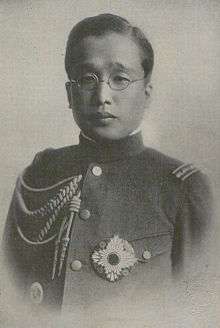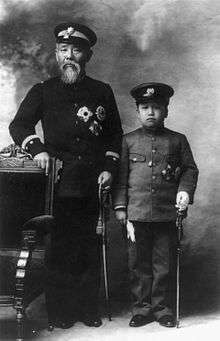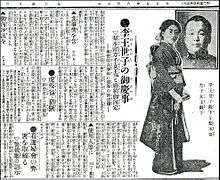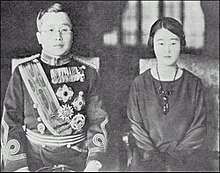Yi Un
| Yi Un, Crown prince Euimin 의민황태자 이은 懿愍皇太子 李垠 | |
|---|---|
| Crown Prince of Korea | |
 | |
| Emperor of Korea | |
| In pretence | 24 April 1926 – 1 May 1970 |
| Predecessor | Sunjong of the Korean Empire |
| Successor | Prince Imperial Hoeun |
| Born |
20 October 1897 Deoksu Palace, Seoul, Korean Empire |
| Died |
1 May 1970 (aged 72) Nakseon Hall, Changdeok Palace, Seoul, Republic of Korea |
| Spouse | |
| Issue |
Yi Jin Yi Gu |
| Father | Gojong |
| Mother | Eom Seon-yeong |
| Yi Un | |
| Hangul | 의민태자 |
|---|---|
| Hanja | 懿愍太子 |
| Revised Romanization | Uimin Taeja |
| McCune–Reischauer | Ŭimin T'aeja |
| Birth name | |
| Hangul | 이은 |
| Hanja | 李垠 |
| Revised Romanization | I Eun |
| McCune–Reischauer | Yi Ŭn |
| Imperial title | |
| Hangul | 영친왕 |
| Hanja | 英親王 |
| Revised Romanization | Yeongchinwang* |
| McCune–Reischauer | Yŏngch'inwang |
| |
Lieutenant General Prince Imperial Yeong, the Yi Un, Crown Prince Uimin (also Euimin), also known as Yi Un, Yi Eun, Lee Eun, and Un Yi (20 October 1897 – 1 May 1970), was the 28th Head of the Korean Imperial House, an Imperial Japanese Army general and the last crown prince of Korea.
Early life

The prince was born on 20 October 1897 at Deoksu Palace in Seoul as the seventh son of Gojong, the Gwangmu Emperor. His mother was the Honorable Princess Consort Eom Seon-yeong, a palace attendant, who was posthumously awarded the title of Princess Sunheon. He was also the younger half-brother of Emperor Sunjong and Prince Imperial Ui. He was titled Prince Imperial Yeong in 1900, and became the crown prince in 1907, despite being younger than Prince Ui. Prince Ui's support base at court was not strong because his own mother, Lady Jang, had already died.
In December 1907, he was taken to Japan on the initiative of Itō Hirobumi to be enrolled at Gakushūin Peers' School. However, the move was meant to ensure that the Korean royal family would not take any further anti-Japanese actions following The Hague Secret Emissary Affair.[1] Emperor Meiji, who largely ignored his own grandchildren, devoted a lot of attention to Yi Un, acting as his guardian.[2]. Ito would bring Yi Un whenever he was visiting the princes Hirohito, Chichibu and Takamatsu.[3] Meiji apparently stopped seeing Yi Un so frequently after Ito's assassination.[4] Yi Un was allowed to visit Korea again only after the death of his mother in 1911.[5]
Upon graduating Gakushūin, Yi Un entered the Imperial Japanese Army Academy, both in Tokyo. Graduating from the academy on 25 May 1917, he was commissioned a second lieutenant in the infantry on 25 December, and steadily rose up the ranks, receiving promotions to lieutenant (April 1920), captain (July 1923) and to major (August 1928).
In 1920, he married Princess Masako of Nashimoto (born 4 November 1901 – 30 April 1989 (aged 87)), the eldest daughter of H.I.H. Lieutenant-General Prince Nashimoto Morimasa, on 28 April 1920 at Tokyo. Prince Morimasa was promoted General in 1922 and was appointed a Gensui in 1932.
In 1910, when the Empire of Korea was annexed by Japan and Emperor Sunjong was forced to abdicate, Yi Un was titled His Royal Highness The Crown Prince of Korea. On 10 June 1926, upon the death of Emperor Sunjong and his funeral, he became King Eun of Korea (demoted Korean sovereign's title after the Japan-Korean Annexation Treaty).
Military career


Prince Yi Eun (also known as Prince Ri Gin in Japan) served in the Imperial Japanese Army as Commanding Officer of the 59th Regiment, the 4th Depot Division, and then later the 51st Division. He received further promotions to lieutenant colonel (August 1932), colonel (1 August 1935), major general (15 July 1938) and to lieutenant general (2 December 1940). He also served in the Imperial Japanese Army Air Force with the rank of lieutenant general, commanding 1st Air Army. He further served as Instructor at Military Staff College, attached to the Inspectorate General of Military Training and became a Member of the Supreme War Council during wartime.[6]
Later life
After Korea became independent of the Empire of Japan in 1945, Prince Yi Eun (also known as H.M. King Eun of Korea) requested permission from President Syngman Rhee to be allowed to return to Korea with his family but was refused. The prince was offered the position of Korean Ambassador to the Court of St. James's in 1960, but refused on the grounds of illness.
In November 1963, President Park Chung-hee granted permission for Prince Yi Eun and Crown Princess Bangja to return to Korea. By that time, Prince Yi Eun was unconscious from cerebral thrombosis. He received treatment at St. Mary's Hospital in Seoul.
In his final years, Prince Yi Eun lived at Nakseon Hall, Changdeokgung Palace, the former residence of the Korean Imperial Family in Seoul, with Bangja and his younger sister Princess Deokhye. Seven years after returning to his country, he died on 1 May 1970 at Nakseon Hall, Changdeok Palace, Seoul. He was buried at Hongreung in Namyangju, near Seoul; he is known posthumously as Yi Un, Crown Prince Euimin of Korea.
Children
- Yi Jin (Hangul: 이진; Hanja: 李晋; RR: I Jin) (born 18 August 1921 – 11 May 1922 (aged 0)), the elder son of Prince Eun and his wife, Princess Bangja. He died abruptly during a visit to Korea with his parents, fueling conspiracy theories. His funeral was held on 17 May 1922 and he is buried in Korea. No issue.
- Yi Gu (Hangul: 이구; Hanja: 李玖; RR: I Gu) (born 29 December 1931 – 16 July 2005 (aged 73)), the second son of Prince Eun and his wife, Princess Bangja. Prince Gu became the 29th Head of the Korean Imperial Household upon the death of his father. He married Julia Mullock, an American citizen (b. 1928) on 25 October 1959 at St George's Church in New York, they had no issue but adopted a daughter, Eugenia Unsuk Lee (Eun-sook) (b. 1959).
Titles from birth
- His Royal Highness The Prince Eun of Korea (1897–1900)
- His Imperial Highness The Prince Imperial Yeong of Korea (1900–1907)
- His Imperial Highness The Crown Prince Eun of Korea (1907–1970)
- The Crown Prince Euimin of Korea (Posthumous Title)
Notes
- ↑ Herbert P. Bix, Hirohito and the making of modern Japan (New York 2016), page 35.
- ↑ Herbert P. Bix, Hirohito and the making of modern Japan (New York 2016), page 35.
- ↑ Herbert P. Bix, Hirohito and the making of modern Japan (New York 2016), page 35.
- ↑ Herbert P. Bix, Hirohito and the making of modern Japan (New York 2016), page 697, note 38.
- ↑ Herbert P. Bix, Hirohito and the making of modern Japan (New York 2016), page 35.
- ↑ Ammentorp, Steen. "Generals from Japan, Yi, part of Generals of WWII". Retrieved 26 August 2016.
Yi Un Born: 20 October 1897 Died: 1 May 1970 | ||
| Titles in pretence | ||
|---|---|---|
| Preceded by Emperor Yunghui |
— TITULAR — Emperor of Korea Korean Empire 24 April 1926 – 1 May 1970 Reason for succession failure: Empire abolished in 1910 |
Succeeded by Gu, Prince Imperial Hoeun |
.svg.png)